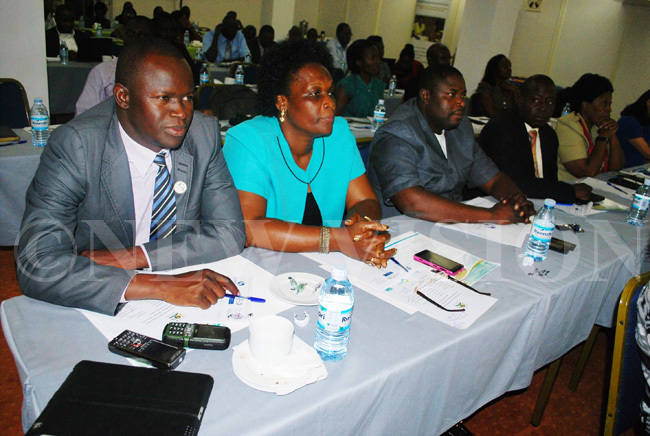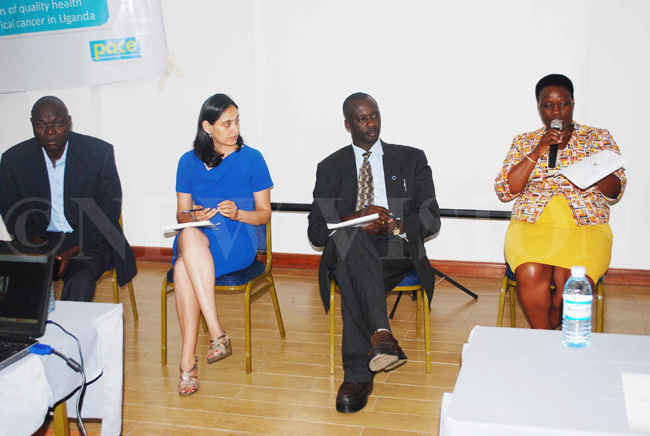Women shun cervical cancer treatment
Jul 25, 2014
A cervical cancer prevention project has carried out screening of 158,972 women in Uganda and treated 2,908.

By Agnes Kyotalengerire
A cervical cancer prevention project has carried out screening of 158,972 women in Uganda and 2,908 of them have received treatment.
The four year cervical cancer prevention and treatment initiative (CCPTI) launched in January 2013 will run till 2016.
The initiative that provides women with affordable access to cervical cancer screening and treatment, targets groups aged between 30 and 49 years; the most vulnerable to cervical cancer disease in underserved regions and communities.
A total of 167 women found with the disease have been referred for treatment of advanced stages of invasive cancer.
“Cervical cancer screening and treatment is a secondary intervention to reduce the cancer among women. If screened early, the cancerous illusions can be identified, treated and one can leave longer,” said Dr. Gerald Mutungi, the project manager non-communicable diseases ministry of health.
 Members of Parliament during the national cervical cancer prevention stakeholders meeting at Metropole Hotel Golf Course. PHOTO/ Agnes Kyotalengerire
Members of Parliament during the national cervical cancer prevention stakeholders meeting at Metropole Hotel Golf Course. PHOTO/ Agnes Kyotalengerire
Mutungi said the major obstacle to cancer screening programmes in the country is that many women never reach the health facilities for diagnosis yet the opportunities are available.
He added that even after diagnosis and being referred, they shun accessing treatment because of the high costs associated with it.
Head of social marketing at Programme for Accessibility Health Communication and Education (PACE), Goretti Masadde said the challenge of high costs can be counteracted by men getting on board and supporting their wives.
“Cervical cancer is always considered a woman’s issue yet men transmit the Human Papilloma Virus (HPV) that causes the disease. It is necessary that men get involved in supporting their wives access treatment because they are the decision makers and they control finances at home,” said Masadde.
The remarks were made during the cervical cancer prevention and Treatment initiative national stakeholders meeting organized by Marie Stopes Uganda in partnership with the Ministry of Health, PACE and Reproductive Health Uganda (RHU) at Metropole Hotel Golf Course Kampala on Wednesday.
The commissioner community health, Dr. Anthony Mbonye said the initiative is already building capacity in the public health sector and is yielding good results.
“As government, we need to scale it up to many health facilities across the country, provide equipment for screening and treatment, ensure there are skilled health workers and reduce the cost of accessing prevention and treatment of cancer of the cervix,” said Dr. Mbonye.

Hon Rosemary Nyakikongoro , moderating a question and answer session during the cervical cancer prevention initiative at Metropole Hotel . Looking on are Gerald Mutungi , program manager Non-communicable diseases, Reena Chowdry and Milton Awudo working with Marie Stopes Uganda. PHOTO/ Agnes Kyotalengerire
Cervical cancer is a genital infection which is sexually transmitted. It presents with an uncontrollable growth of the abnormal cells in the cervix. It is the most common viral infection in the reproductive tract caused by the HPV.
Over 85% of women who die as a result of cervical cancer live in resource constrained countries like Uganda, with limited access to cervical cancer prevention programmes according to WHO report 2006.
According to data from ministry of health, it is estimated cervical cancer is the most common reproductive health cancer among women and accounts for up to 40% of all cancer cases in Uganda.
Every year, about 3600 women are diagnosed with cervical cancer and about 2,500 die of the disease.
Related Stories
Cervical cancer: Uganda’s leading silent killer of women
Cervical cancer, diarrhoea vaccines set for 2015
Cervical cancer vaccination for next year
